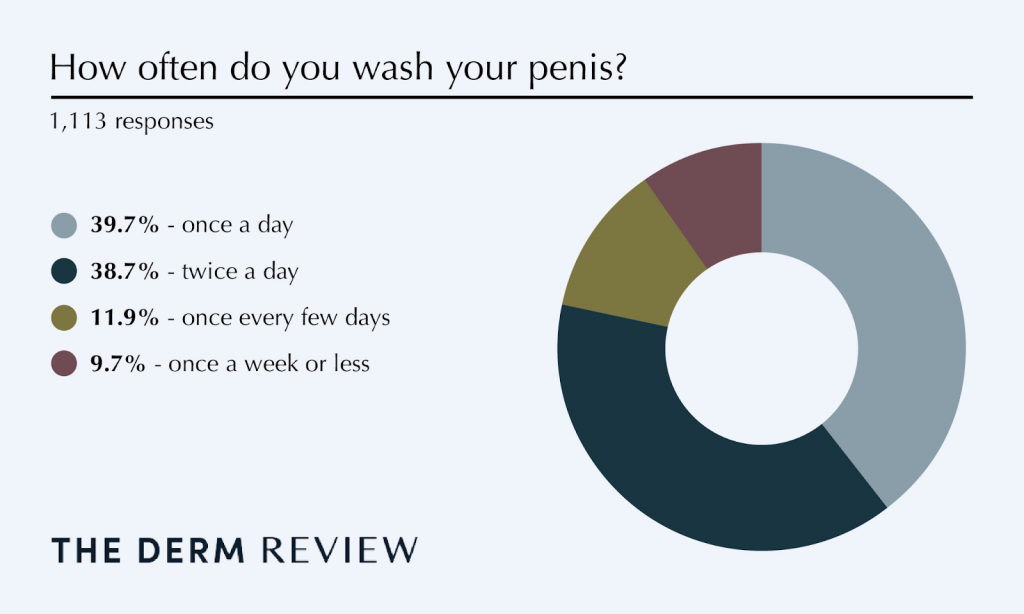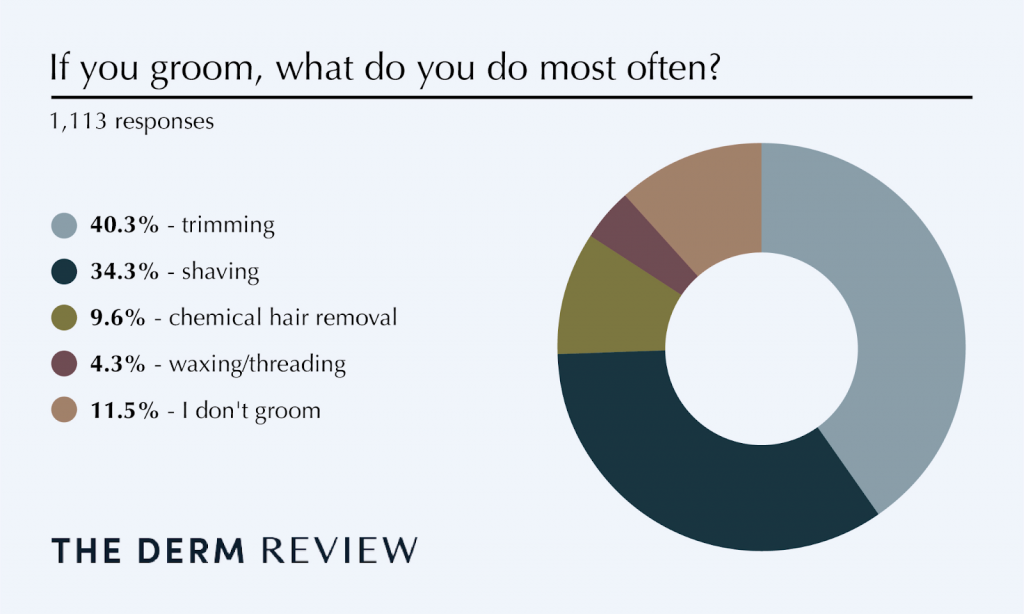We asked over 1,100 men about their intimate skincare and grooming habits, to help provide advice on how often you should wash your privates.
- Men’s intimate area should be washed once every day, according to Elle MacLeman, The Derm Review’s Skincare Biochemist
- Over 60% of men are washing their penis incorrectly
- Washing your private parts less often than once a day can result in infection while washing too often can lead to skin irritation
- One in five (21.6%) say they wash their intimate areas once every few days or less often
- 39.7% say they wash their penis once a day, 38.7% wash “it” twice a day
- More than four out of five men (81.7%) groom their penis and surrounding areas
- 71.2% say they plan to groom more regularly when all social distancing restrictions are removed
- Trimming is the preferred grooming option (40.3%), followed by shaving (34.3%), chemical hair removal (9.6%) and waxing/threading (4.3%)
We asked 1,113 men about their intimate hygiene habits. Despite advice to wash your privates daily, our survey revealed that 21.6% of men fail to do so – putting them at risk of a nasty infection. 11.9% say they wash “it” once every few days, while one in ten (9.7%) wash their intimate area once a week or even more infrequently.
Most men (39.7%) stick to the advice and wash their privates once a day. 38.7% wash their genitals twice a day, which can cause skin irritation and remove the body’s natural oils.

How often should you wash your penis?
Elle MacLeman, Skincare Biochemist here at The Derm Review says:
“Our survey found that most men clean their private parts daily, which is the recommended amount. Warm water is absolutely fine, but if you prefer, you can also use a gentle soap or shower gel.”
“Nearly four in ten men wash their genitals twice a day, and while this may seem like good intimate hygiene practice, washing too often can actually cause problems as well. The skin in this area is very sensitive and washing it more than once a day can cause irritation, dryness and itching.”
“Most worryingly, our survey found that one in five men (21.6%) wash their private area once every few days or less often. Infrequent washing will not only result in an unpleasant smell, but it is also a breeding ground for bacteria and can cause pain and infection.”
Elle’s intimate hygiene tips:
- Wash your penis and surrounding area once every day with warm water or a non-perfumed soap or shower gel
- Don’t wash your penis too often as it can remove your body’s natural oils
- Avoid heavily perfumed products, talcs and deodorants as these may cause irritation
Intimate grooming habits
We also asked men about their grooming habits and found that the majority (81.7%) groom their penis and surrounding area. The most common grooming method is trimming (40.3%), followed by shaving (34.3%), chemical hair removal (9.6%) and waxing/threading (4.3%).

When asked whether the pandemic had an impact on their grooming habits, 6.5% of men say they stopped grooming when the pandemic hit. 71.2% admit they plan to groom more regularly when all social distancing restrictions are removed.
Intimate grooming best practices
Elle points out that while most men choose to groom their private parts to keep their pubic hairs in check, it’s important to remember there is a reason you have hair down there.
“While a majority of men trim their nether region, it is important to remember that pubic hair serves a purpose, and removing it completely can cause skin irritation, cuts and problems with ingrown hairs.”
“The skin surrounding your penis is very sensitive, and shaving may cause small cuts that could get inflamed. And unless you wait for the cut to heal while engaging in sexual activities, you could indeed increase your risk of contracting STDs.”
“If you opt for grooming your public hairs, make sure that both you and the tools you are using are clean. If you can, try to leave a short layer of hair to help protect your skin.”
Methodology:
This representative survey was conducted online in May 2021 and polled 1,113 men, using Amazon’s Mechanical Turk platform.
In terms of age range, 50.3% of our respondents were aged 25-34, 25.4% were aged 35-44, 12.1% were aged 18-24, 7.6% were aged 45-54, 3.9% were aged 55-64 and 0.6% were 65 years or older.

